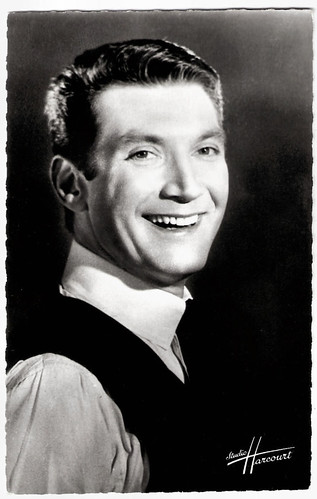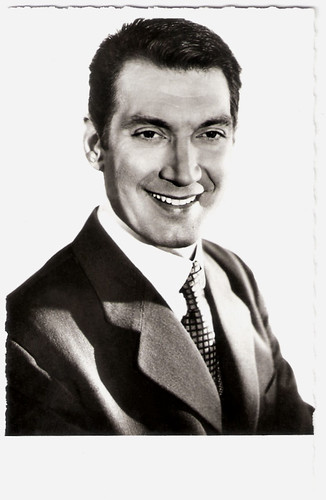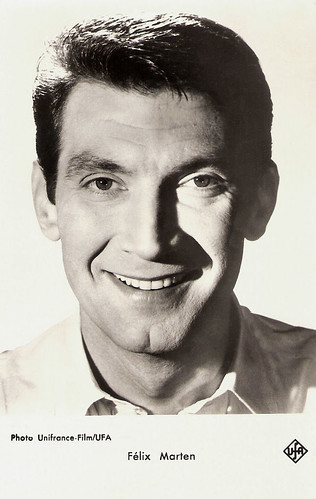
French postcard by Editions P.I., Paris, no. 2336. Photo: Carla Menegol.
Arrested by the Gestapo
Paul Gabriel Félix Marten was born in Remagen, Germany, in 1919. To flee Nazism and anti-Semitism, his family went in exile and took refuge in the Paris region.
Forced to start working young, Félix had all kinds of jobs. First, he became a salesman at Les Galeries Lafayette, only 15 years old. He also worked as a dockworker, a carpet dealer, etc.
With his good looks, he dreamed to become an actor. On the advice of friends, he started to take lessons at the drama academy of Charles Dullin. Then war broke out and in 1944 the Gestapo arrested him and he had to do obligatory work in Germany.
After his return to France, he hoped to become a pop singer. He started to perform in cabarets in Paris and in the provinces and even abroad in Indochina.
Édith Piaf noticed him and gave him advice for his future career. He became known for singing songs like 'La Mer' and 'La Vie en Rose'. Marten soon got engagements at the major venues in Paris, the Bobino and the Olympia.

French postcard by Edition du Globe (EDUG), Paris, no. 698. Photo: Studio Harcourt.

French postcard by Editions P.I., Paris, no. 1093, offered by Les Carbones Korès 'Carboplane'. Photo: Marcel Bouguereau.
Nouvelle Vague classic
Félix Marten started a second career in the cinema. In 1946, he made his film debut in Rêves d'amour/Love Dreams (Christian Stengel, 1947) in which Pierre Richard Willm starred as piano virtuoso and composer Franz Liszt.
In the next decades, Marten appeared in many French films and played opposite such major stars as Martine Carol, Michèle Morgan and Jean Gabin.
Among his best known films are the Nouvelle Vague classic Ascenseur pour l'échafaud / Elevator to the Gallows (Louis Malle, 1958) starring Jeanne Moreau and Maurice Ronet, Le Saint Mène La Danse / The Dance of Death (Jacques Nahum, 1960) in which he starred as Simon ‘The Saint’ Templar, and Paris brûle-t-il? / Is Paris burning? (René Clément, 1968) with Jean-Paul Belmondo.
However, his film appearances were mostly brief and seem forgotten now. Although his singing career suffered, he kept touring around the world. In 1989, he retired after a final concert at the Casino de Paris. That same year, he also appeared one more time on the screen in an old Scopitone film that was integrated in Il y a des jours et des lunes / There Were Days... and Moons (Claude Lelouch, 1989). It was a Scopitone clip for the song 'La Rigolade' (The Joke) that had been directed by Claude Lelouch in 1961.
At the age of 73, Félix Marten died in 1992 in Saint-Cloud, France, of a pulmonary embolism. He was divorced twice. His last wife was Fabienne Godard.

French postcard by Editions P.I., Paris, no. FK 59 A, offered by Les Carbones Korès 'Carboplane'. Photo: Unifrance-Film / Ufa.
Scopitone clip for the song 'La Rigolade' (The Joke). Source: hebephreniac1 (YouTube).
Sources: Wikipedia (French and German) and IMDb..
This post was last updated on 29 May 2025.
No comments:
Post a Comment